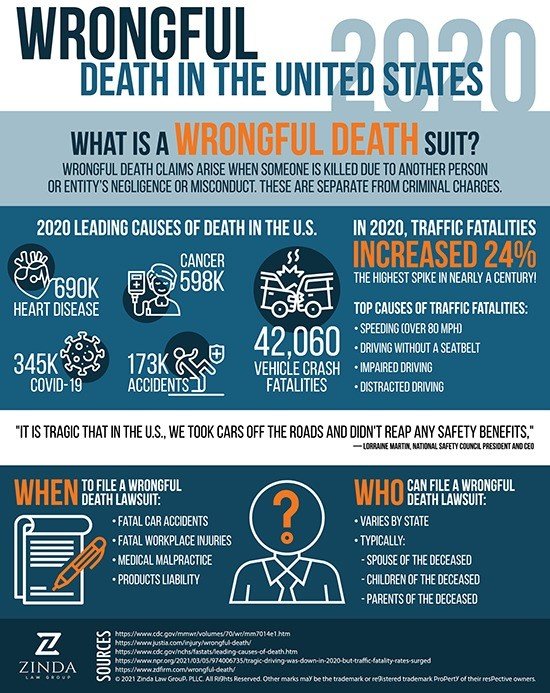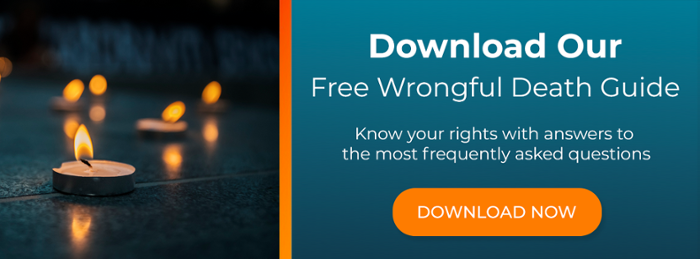Call (800) 863-5312 to Speak with Our Attorneys
In legal terms, a “wrongful death” is when someone dies or is killed due to the negligence of another. That negligent party could be the other driver in a car accident or a company that failed to maintain proper safety standards. Wrongful death lawsuits are brought in pursuit of compensation for the survivors’ loss, including lost wages from the deceased, any pain and suffering the deceased suffered before death, loss of companionship, and funeral expenses. If your loved one died in an accident caused by someone else, it’s important to speak with experienced wrongful death lawyers as soon as possible.
You don’t have to go through this process alone. The nationwide wrongful death attorneys at Zinda Law Group are here to help you and your family through this difficult time. Our wrongful death lawyers are ready to answer your questions and advise you on the best way to move forward.
Call Zinda Law Group today at (800) 863-5312 for a free consultation with a wrongful death attorney near you.
Free Consults24/7
Send Request NowWhen Can I File a Wrongful Death Lawsuit?
A wrongful death lawsuit can be brought if the deceased lost their life due to another’s negligence, or intentional act, and the deceased’s family members were directly impacted due to their death. Wrongful death lawsuits are civil lawsuits comparable to personal injury claims. The major difference is that because the victim of the fatal injury is unable to pursue the lawsuit, family members or the deceased’s estate bring the lawsuit on the victim’s behalf with the help of a wrongful death attorney.
Wrongful death suits may be brought after a variety of fatal circumstances, including:
- Fatal car accidents – there are approximately 37,000 car accident deaths per year caused by speeding, reckless or distracted driving, drunk driving, road defects, or automobile defects.
- Fatal workplace injuries – although employers are responsible for the safety of their employees, fatal workplace injuries can and do happen every day.
- Medical malpractice – although the vast majority of healthcare professionals are extremely good at their jobs, there have been cases in which doctors or nurses cut corners allowing accidents to happen. Examples of medical malpractice wrongful death lawsuits include surgical errors, improper treatment or diagnosis, and defective medical devices.
- Product liability cases – defective products can lead to fatal accidents in extreme circumstances. Defective products can include defective vehicles, machinery, or pharmaceuticals.
If you have lost a loved one and are confused about your options, consider consulting a wrongful death attorney who can determine if filing a wrongful death lawsuit is in your best interest. Filing a wrongful death lawsuit can help ease the financial burden created by the negligent party.
Wrongful Death Lawsuit Process with a Wrongful Death Lawyers
If a person’s death is caused by the negligence or intentional act of another person or entity, the estate of the deceased or the deceased’s surviving family members may have the option to bring a civil lawsuit seeking damages. This is called a wrongful death lawsuit. Each state has different laws governing the wrongful death process, so for the best description of how your state handles wrongful death cases consider consulting an experienced wrongful death attorney. Regardless, there are some common pieces that are prevalent all across the country.
In wrongful death claims, the party bringing the suit has the burden of proof and must prove that the opposing party was at fault for the deceased’s death. This is most likely proven through negligence. If this is proven, then damages may be awarded. Damages can again range from state to state but usually include compensation for pain and suffering incurred, medical expenses, funeral expenses, and loss of future income or companionship. Alternatively, the defendant may choose to instead settle before trial on an agreed-upon amount.
Because of the importance of wrongful death claims, it may be in the best interest of those seeking to file such a claim to consult with an experienced wrongful death attorney as soon as possible. Although the party seeking compensation can never truly be made whole again, an experienced wrongful death attorney can help them seek maximum financial compensation to help with expenses relating to the incident.
Who Can File a Wrongful Death Lawsuit?
The people who can file a wrongful death lawsuit varies from state to state. To get the most accurate description of who is able to file a wrongful death lawsuit consider consulting an experienced wrongful death attorney. That being said, there are some common parties that may file wrongful death claims across the states.
- All states allow wrongful death lawsuits to be filed by immediate family members.
- In most cases, spouses of the deceased may bring a wrongful death lawsuit.
- If the deceased was a child, some states allow the parent to bring the lawsuit.
- If the deceased was a single adult, some states allow extended family members to bring the lawsuit. Examples of extended family members include siblings, grandparents, or stepparents.
- If the deceased had a will, the wrongful death lawsuit is usually brought by the executor or personal representative of the estate. If the court determines that the executor personal representative is the best party to bring such a claim, then they will likely have the exclusive right to file a wrongful death lawsuit.
It is important to remember that in most cases, only one wrongful death lawsuit may be filed on behalf of the deceased. If there are disputes as to which claim is proper, the court has the option to consolidate multiple lawsuits into a single lawsuit. Regardless, it may be in the best interest of those seeking compensation to discuss their options with an experienced wrongful death attorney to make the process as efficient as possible.
How Long Do I Have to File a Wrongful Death Lawsuit?
States vary on the amount of time parties have to file a wrongful death lawsuit. These time limits are called “statutes of limitations.” Statutes of limitations strictly dictate how long a party has to file such claims. If a party waits too long, going beyond the statute, the courts may prevent them from filing a wrongful death lawsuit.
In order to get an accurate timeframe on when you must file your wrongful death lawsuit, consider consulting with an experienced wrongful death attorney. An experienced wrongful death attorney can explain to you your state’s wrongful death statute of limitations and apply that timeframe to the unique facts of your case. This is very important if you hope to seek maximum compensation for your loss, so consulting with an attorney may be your best option.
What Do I Need to Prove?
When bringing forth a wrongful death claim, the party seeking compensation must meet the same burden of proof that the deceased would have had to meet if they had lived. In most cases, this means proving negligence. To prove negligence the party seeking compensation must prove that the defendant owed the deceased a duty of care, the defendant breached that duty of care, the breach was the cause of the death, and the death caused the damages that the party seeking compensation is trying to recover. It is important to remember that wrongful death claims have a lower standard of proof than any criminal claim.
How Much Compensation Can I Seek?
States vary on the areas of compensation that parties may seek in wrongful death claims. To get an accurate list of areas that your state allows consider consulting a wrongful death attorney who can take a look at your case and explain to you the potential outcomes. Common areas of compensation include:Pre-death pain and suffering
- Pre-death medical expenses
- Funeral and burial expenses
- Loss of the deceased’s expected income
- Loss of consortium
- Loss of inheritance
- Loss of companionship
- Punitive damages – these damages are intended to punish the party who caused the death and deter future similar behavior. Not all states offer punitive damages.
How Are Settlements Distributed?
Many wrongful death claims settle before even reaching a trial. Defendants in wrongful death claims may choose to settle outside of court in order to avoid a lengthy trial process or to avoid negative publicity. Settlements can be achieved through mediation or arbitration as alternatives to trials.
Settlements can be distributed as a lump-sum payment or a structured settlement agreement. A lump-sum payment is when the party bringing the wrongful death lawsuit receives a full payout for damages they suffered. This full payout allows the filing party to pay its larger expenses as soon as possible, allowing for more financial flexibility. A structured settlement distributes scheduled payments. This form of settlement does not have the flexibility of the lump-sum payment. For example, lump-sum payments may be difficult to change, even if changes in financial circumstances occur.
Do I Need a Lawyer?
Consulting a lawyer is often your best option when considering filing a wrongful death claim. Wrongful death claims can be confusing and mentally exhausting. An experienced wrongful death attorney can help you better understand the process, explain potential outcomes, and advocate on your behalf in an effort to pursue maximum compensation. If you want to seek maximum financial compensation for your loss, you should certainly consider consulting an experienced wrongful death attorney.
Learn More: Why Hiring A Personal Injury Lawyer Will Help Your Case
GET HELP FROM EXPERIENCED WRONGFUL DEATH LAWYERS
At Zinda Law Group, our wrongful death attorneys have helped many families seek the justice and the compensation they deserved after suffering the loss of a loved one. We have the knowledge, experience, and resources necessary to help you through this difficult time, and as our client, you will pay nothing unless we win your case.
Call Zinda Law Group today at (800) 863-5312 to receive your free consultation with one of our wrongful death lawyers.
We’ve Helped Wrongful Death Clients Nationwide Including:
- Texas Wrongful Death Lawyers
- Colorado Wrongful Death Lawyers
- Arizona Wrongful Death Lawyers
- New Mexico Wrongful Death Lawyers



























